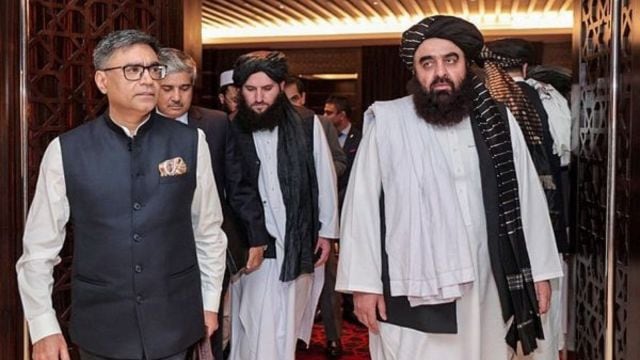

Shantesh Kumar Singh
Jan 9, 2025 17:40 IST First published on: Jan 9, 2025 at 17:30 IST
On January 8, senior officials from India and Afghanistan met in Dubai and conversed on several issues ranging from security concerns to cricket. This was an upscaling from the earlier meetings between the two countries since the Taliban took over, where India was only represented by officials of the joint secretary level. The presence of Indian Foreign Secretary Vikram Misri indicated the opening of new avenues.
According to reports, Afghan Foreign Minister Mawlawi Amir Khan Muttaqi heard India’s security concerns while Misri underlined the country’s willingness to help in Afghanistan’s immediate humanitarian and developmental issues. India is working to stabilise its relationship with the current Taliban leadership, besides striving to keep China and Pakistan at a distance. This comes at a time when the relationship between Pakistan and Afghanistan reached a new low as Islamabad launched consecutive airstrikes, allegedly killing several people.
Afghanistan’s geopolitical significance extends far beyond India and Pakistan. It is a multi-ethnic, landlocked country that has been at the centre of global politics primarily because of its location — its proximity to Central Asia, the Middle East and South Asia. Its unique location has always attracted the interest of major global as well as regional powers. Afghanistan served as a buffer zone during the 19th-century tussle between Czarist Russia and imperial Britain. During the Cold War, Afghanistan was at the centre of a rivalry between the US and USSR. In the post-9/11 “war on terror”, Afghanistan was again at the centre of geopolitics. Global powers have used Afghanistan as a tool to serve their national interests. But the relationship between India and Afghanistan is ancient. It can be traced back to the Indus Valley civilisation. The bedrock of the relationship, post India’s independence, is the Treaty of Friendship that was signed on January 4, 1950.
India has diligently crafted its policy towards Afghanistan by maintaining a balance between serving its national interest and at the same time meeting the needs of the Afghani population, showing its uncompromising conviction towards democratic values and humanitarian assistance. It was only when the Taliban rose to power during the 1990s with the backing of Pakistan’s ISI (Inter-Services Intelligence) that the relationship was affected. It further deteriorated after the hijacking of an Indian Airlines Flight IC814 in Kandahar in 1999.
But it got back on track with the partial restoration of democracy in 2001 when Hamid Karzai became the country’s president. India again got involved in the reconstruction of Afghanistan across various sectors, including infrastructure, defence, health and education.
The reflection of India’s commitment towards Afghanistan and its people is visible in the Delaram-Zaranj highway, Salma Dam that was inaugurated by Prime Minister Narendra Modi on June 4, 2016, the reconstruction of the Indira Gandhi Institute of Child Health in Kabul (that was made in 1969 with the help of Indian government and was named after the then PM Indira Gandhi), the construction of a new parliament (inaugurated by Modi with the Afghan President Ghani in 2015), an increase in the number of Afghan students coming to India under academic exchange programmes and the rise in the number of Afghan people in medical tourism.
This developmental and humanitarian assistance received a setback with the coming back of the Taliban in 2021 following the withdrawal of US troops. However, India continued to support Afghanistan during crises. During the Covid pandemic, India gave 50,000 metric tons of wheat and essential medical supplies as humanitarian aid. But Delhi has made its position clear: Afghanistan must restrict terrorist organisations from using its land against India’s national security interests.
most read
The importance of India’s support could be found in the working style of the Taliban leaders as well, who have been trying to engage with India on different fronts. In August 2021, India made the first move when Deepak Mittal, India’s ambassador to Qatar, met the Taliban’s Doha office representatives. In June 2022, there was a further meeting between J P Singh, joint secretary of the Ministry of External Affairs, and the Taliban leaders. According to reports, Singh and Taliban leaders held at least four meetings since then. These consecutive conversations led to India sending a technical team to the Indian embassy in Kabul.
The latest meeting in Dubai, thus, holds hope for the future. On one hand, it showcases India’s commitment towards a stable relationship with Afghanistan, on the other, it gives a strategic advantage to India at a time when China is trying to make inroads through investments and projects.
The writer is professor at School of International Studies, JNU and editor of the book Emerging Dynamics of India-Afghanistan relations (Palgrave Macmillan, 2024)
Discover the Benefits of Our Subscription!
Stay informed with access to our award-winning journalism.
Avoid misinformation with trusted, accurate reporting.
Make smarter decisions with insights that matter.
Choose your subscription package


